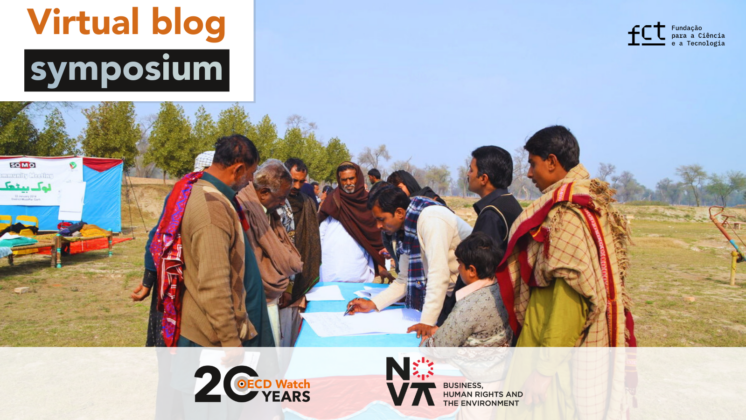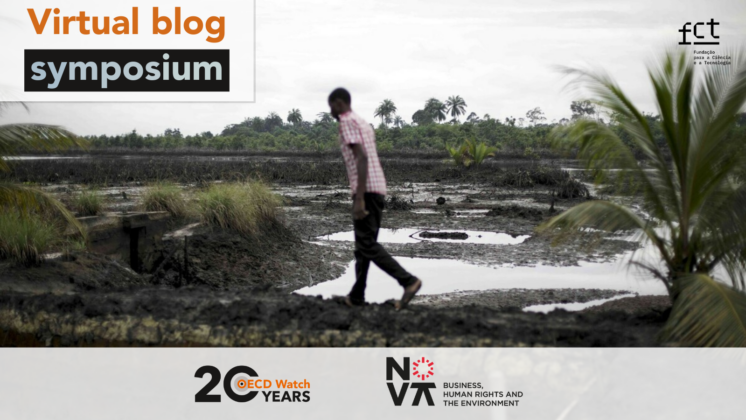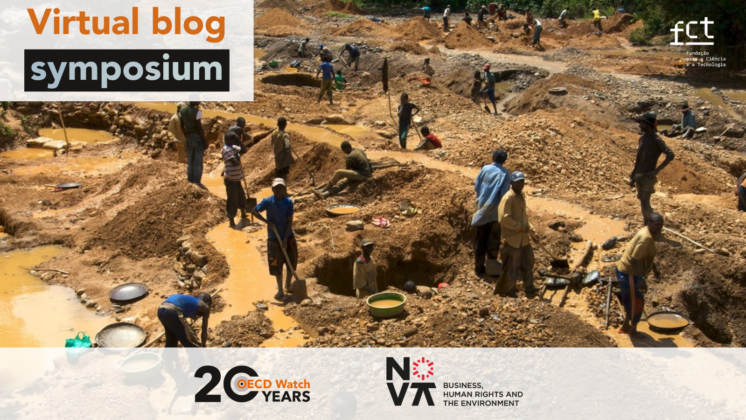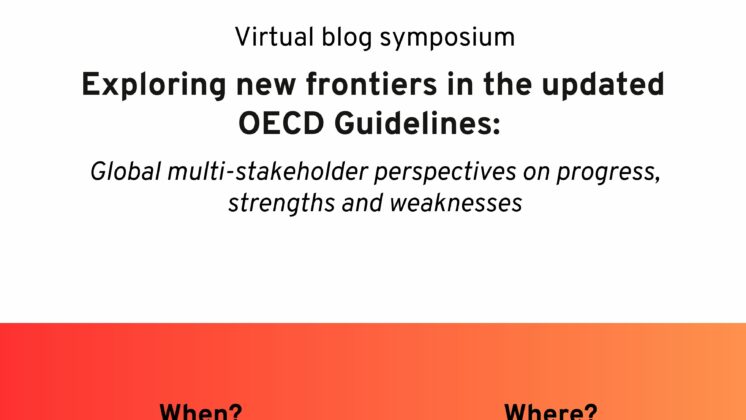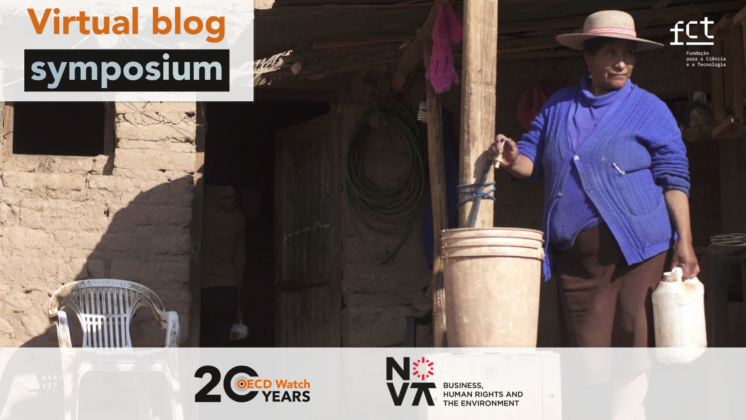By Jonathan Kaufman
Blog symposium co-organised by OECD Watch and NOVA School of Law
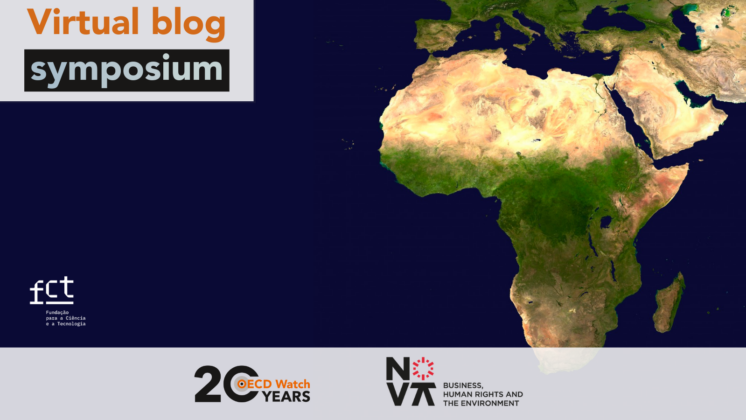
Every rainy season for almost 50 years, Aggah Community in Rivers State, Nigeria, has faced a devastating reality: the natural watercourses that previously flowed freely through the village to the nearby Oloshi River run into elevated roadways and embankments built by a local subsidiary of Eni, the Italian oil giant. The waters then back up into the inhabited and cultivated areas of the community, creating floods that last months. During the flood season, malaria rates spike, crops rot in the fields, and inundated pits become hazards that have cost villagers their lives.
Frustrated by decades of fruitless negotiations and complaints, the people of Aggah filed a complaint against Eni with the Italian and Dutch National Contact Points (NCPs) for the OECD Guidelines on Multinational Enterprises in 2017. The Italian NCP appointed a mediator to settle the dispute, leading to an agreement (the Terms of Settlement, or ToS) in which Eni agreed to undertake engineering work intended to alleviate the flooding in Aggah.
In the ensuing years, Eni and its local subsidiary, NAOC, have hired engineers who have done little to end the flooding in Aggah. The NCP’s involvement ended in 2020, with a single follow-up report that noted disagreements on implementation between the parties. Eni now insists that it has met its obligations and is not required to go any further in remediating the floods. The people of Aggah continue to suffer.
In 2023, the OECD undertook a “targeted update” of the Guidelines, adopting much-heralded provisions on climate change and stakeholder engagement, among others. In this post, we use the case study of Aggah to consider whether these changes give hope to African communities in future OECD cases.
Climate Change Adaptation and Mitigation
From the beginning of the specific instance process, Eni insisted that it was not responsible for the floods – despite the contrary findings of regulatory and judicial authorities, as well as its own technicians – and that Aggah suffered from being in a flood-prone area. This denial underpinned its insistence that beyond digging culverts that (when functional) allow water to pass through its embankments, it has no further obligation to the community.
The updated Environment chapter of the 2023 Guidelines expressly refers to climate change as an “adverse environmental impact” in which companies can be involved. The Commentary directs companies to contribute to international goals of climate change adaptation and mitigation (para. 66), and to avoid activities that undermine community adaptation and resilience to climate change (para. 79). Rainy seasons are getting longer and more intense in the Niger Delta, and floods are becoming more likely due to climate change. If these provisions had been in the Guidelines when the complaint was filed, the complainants could have argued the expectation that Eni had a proactive responsibility to help the community alleviate the floods, since the interaction between its facilities and the worsening rains certainly increases the likelihood of climate change-linked damage to person and property. In other words, the climate change provisions would have defanged Eni’s excuse for inaction.
This application of the new climate change provisions could have parallels across Africa. In southern Senegal, for example, a mining company’s environmental impact assessment dismisses the existential threat its proposal to excavate a fragile barrier dune poses to the coastal community of Niafrang by pointing to existing sea level rise and salinization of fresh water sources. Under the newly updated Guidelines, such excuses wouldn’t fly; the company would be expected to contribute to the community’s resilience to climate change, not undermine it.
Meaningful Stakeholder Engagement
Many of the ToS implementation problems between Aggah and Eni can be traced to a failure to engage and include the community in the resolution of the flooding problem. Time and again, Eni and NAOC made unilateral decisions, engaging untrustworthy contractors and designing interventions that had no discernible effect on the flooding situation at Aggah.
The 2023 Guidelines update calls for companies to engage in “meaningful” stakeholder engagement that, relevantly, is “two-way” and “responsive to stakeholders’ views” (para. 28 of the Commentary on Chapter II: General Policies). If these provisions had been in the Guidelines when the complaint was filed, we could have made a more forceful case that Eni was not honoring the Guidelines in its method of implementation by excluding the affected community from assessing contractors and designing engineering interventions.
These omissions resonate with cases across Africa. In northeastern Guinea, for example, AngloGold Ashanti imposed a resettlement plan on residents when it dug a new goldmining pit in the town of Kintinian, without any meaningful consultation at all. The consequence was a plan that coerced people into giving up their land, undervalued assets, and supplied them with replacement housing in an area devoid of infrastructure necessary for them to rebuild their lives with a modicum of dignity. When stakeholder engagement must be “meaningful” rather than a check-the-boxes exercise, these problems can be avoided.
Too Little, too Late
While the advances described above are promising, all the new substantive content in the world can do little to improve the lot of African communities without provisions to hold companies accountable for their commitments. In most of Africa, where accountability institutions tend to be weak, the Guidelines need a correspondingly strong architecture if they are going to make a difference.
Determinations of non-compliance
Specific instance complaints could be more effective in the African context if NCPs were all empowered and directed to make determinations as to the compliance of the respondent company with the Guidelines.
In the Aggah case, the NCP published a follow-up report, although the complainants had to push hard for their version of the facts to be heard. The report that was finally adopted acknowledged disagreements in the effectiveness and scope of implementation of the ToS. There was little the NCP could do to encourage Eni to meet its commitments, however, because it would not make determinations in its Final Statement as to Eni’s compliance with the Guidelines.
The 2023 Guidelines update strengthens the expectation that NCPs will prepare follow-up reports. However, the updated Implementation Guidelines leave it up to individual member states to decide whether their NCPs may make factual determinations (Procedures I.C.4.c), and many do not.
Consequences
Specific instance complaints would also be more effective in the African context if there were consequences to respondent companies for failing to respect the Guidelines or to honor their commitments in mediated settlements.
In the Aggah case, the NCP had no power to impose or recommend consequences, such as the withdrawal of state aid or exposure to civil penalties or government investigation. Even if it had been willing to try, there was little the NCP could do to encourage effective implementation of the ToS, even though it recognized substantial disagreements between the parties.
Conclusions and Recommendations
Successive updates have packed the OECD Guidelines with a nearly encyclopedic array of human rights-protective substance. These advances are incredibly important – they serve as evidence of the development of international norms and inform corporate public commitments. But without accountability, communities in Africa – Aggah included – will be hard-pressed to use these standards to protect their human and environmental rights.
In the absence of effective OECD action, the time has come to focus more squarely on national level implementation of the Guidelines. Rather than cramming more standards into the Guidelines, advocates should focus on reforms that give those standards clout. State agencies providing assistance and revenue streams to multinational companies – export credit agencies, political risk insurance providers, state contracting offices – should adopt the Guidelines as express conditions of patronage. Affected communities should be given a means of contesting a given company’s performance. Justice officials should be directed to seek legal redress against companies that take the State’s money and commit to the Guidelines but fail to honor their promises. Legislatures should enact fiscal incentives and preferences for companies that enshrine respect for the Guidelines in their corporate statutes, supply chain contracts, and actual conduct.
Unless there are consequences for failure to respect the Guidelines, concomitant rewards for upholding them, and more robust procedures for identifying and certifying good and bad practice under the Guidelines, they will serve as cold comfort to African communities, no matter how many laudable standards are included. If the OECD cannot provide these features, advocates should look to those that can – national governments – and put teeth into the expectation that adhering countries will promote and implement the Guidelines.
 About the author
About the author
Jonathan Kaufman is the Executive Director of Advocates for Community Alternatives (ACA). A human rights lawyer with over a decade of experience litigating and working with local partners on corporate accountability cases on all six continents, he founded and has run ACA to support West African communities threatened by extractive investment with legal and development assistance since 2016. He was previously the Legal Advocacy Coordinator for EarthRights International and served on the Stakeholder Advisory Board for the U.S. National Contact Point for the OECD Guidelines.
About the blog symposium
2023 is a momentous year in the corporate accountability world. In June, not only did the OECD adopt key revisions to the newly renamed OECD Guidelines for Multinational Enterprises on Responsible Business Conduct, but the European Parliament also agreed on its position on the proposed directive on corporate sustainability due diligence. In recognition of these important events, NOVA BHRE and OECD Watch are co-hosting a blog symposium in October and November 2023 focused on the updated OECD Guidelines in the context of the current corporate accountability landscape.
The views and opinions expressed in this blog represent the views of the author and does not necessarily represent those of OECD Watch or NOVA School of Law.


